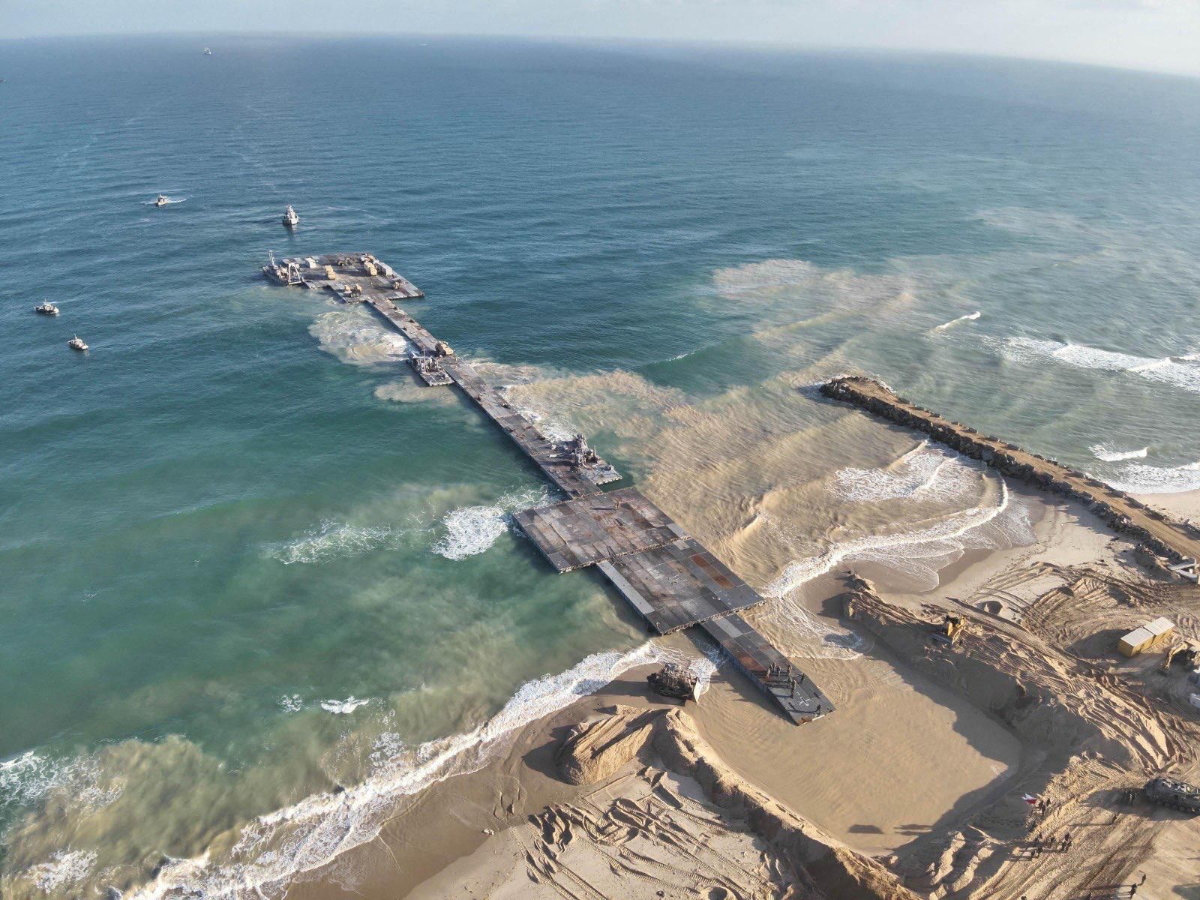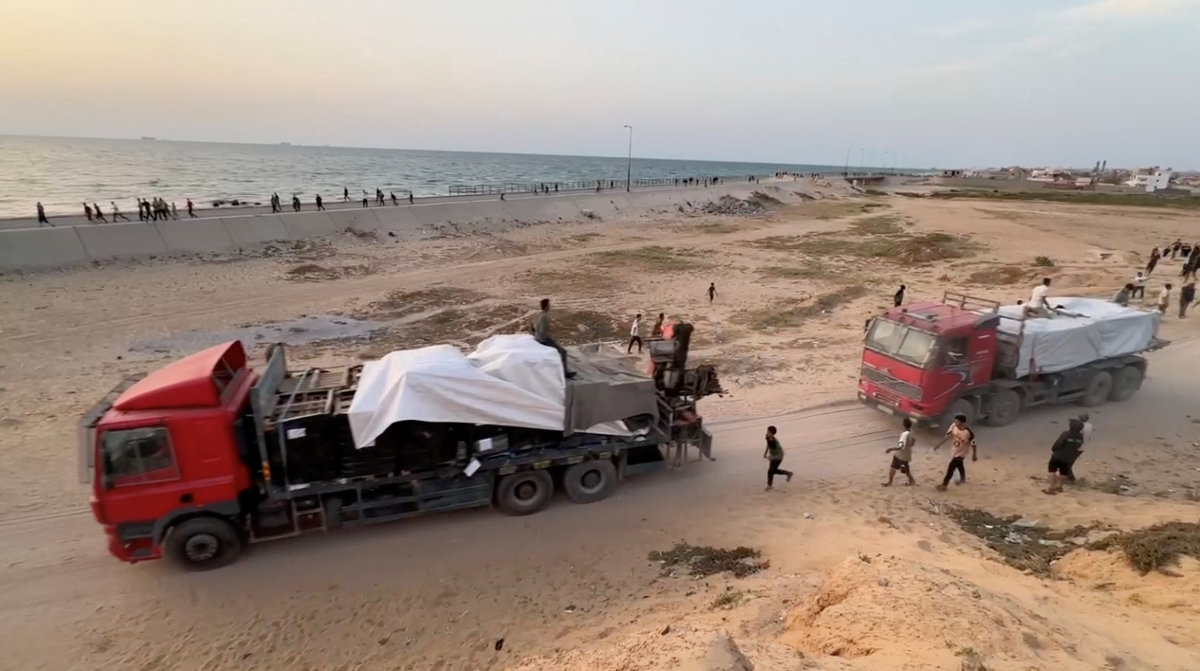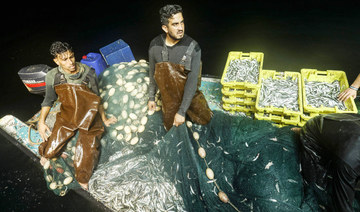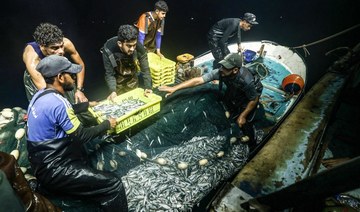GAZA CITY, Gaza Strip: Afaf Al-Najar had found a way out of Gaza.
The 19-year-old won a scholarship to study communications in Turkey, secured all the necessary travel documents and even paid $500 to skip the long lines at the Rafah crossing with Egypt.
But when she arrived at the border on Sept. 21 she was turned back — not by Israel or Egypt, which have imposed a 14-year blockade on the Gaza Strip — but because of a male guardianship law enacted by the Hamas group, which rules the territory.
“I honestly broke down,” she said, describing the moment border officials removed her luggage from the bus. “My eyes started pouring, I could not even stand up. They had to bring a chair for me... I felt my dream is being robbed.”
Travel in and out of Gaza, a coastal territory that is home to more than 2 million Palestinians, has been severely restricted since 2007, when Hamas seized power from rival Palestinian forces. Israel, which has fought four wars with Hamas, most recently in May, says the blockade is needed to keep the militants from rearming. Critics view it as a form of collective punishment.
Hamas has repeatedly demanded the lifting of the blockade. But in February, an Islamic court run by Hamas issued a notice saying that unaccompanied women must get permission from a male “guardian” — a husband, relative, or even a son — to travel outside the territory.
After a backlash led by human rights groups, Hamas authorities amended the ruling to drop the requirement. Instead, it said that a male relative can petition a court to prevent a woman from traveling if it would result in “absolute harm.” Women cannot prevent men from traveling.
Hamas has only taken sporadic steps over the years to impose Sharia, or Islamic law, on already conservative Gaza, and even then has usually backed down in the face of criticism. It does not share the extreme ideology of more radical factions such as the Daesh group.
But the amended law has remained in effect.
Al-Najar’s father filed a petition, and the court prevented her from traveling so that it could consider it. She lives with her mother, who is separated from her father, and says he cut off all contact with her in May. He could not be reached for comment.
Hamas officials did not respond to repeated requests for comment.
Human Rights Watch, a New York-based group that is deeply critical of the blockade, called on Hamas to lift its restrictions.
“Hamas’s authorities should lift the travel ban on Afaf Al-Najar and the Supreme Judicial Council should withdraw its notice, so that women in Gaza can travel without discriminatory restrictions,” it said.
After being turned back at the border, Al-Najar appealed to a number of local human rights groups, but said they appeared reluctant to assist her, fearing reprisal from Hamas. Eventually, she filed a petition against the ban.
Her father failed to show up at the first hearing, causing it to be postponed. Before it adjourned, the judge asked her why she was going abroad and suggested she could just as easily study in one of Gaza’s universities.
Al-Najar, who speaks fluent English and teaches the language, aspires to be a journalist. She says a multi-cultural country like Turkey provides opportunities that don’t exist in Gaza, which is largely cut off from the outside world.
The hearing was postponed a second time because her father’s attorney was sick. It was postponed a third time on Wednesday because his new lawyer said he needed time to study the case.
The scholarship’s validity was extended until the end of the year, but if Al-Najar does not make it to Turkey by then, she will lose it.
But she’s not giving up.
“I realized no one is going to help me but myself, and I realized that I have to be strong now to fight for my rights,” she said. “Instead of crying in my room and letting myself down, I decided to fight. I chose to fight for the first time in my life.”
Hamas ‘guardian’ law keeps Gaza woman from studying abroad
https://arab.news/9829c
Hamas ‘guardian’ law keeps Gaza woman from studying abroad

- When Afaf al-Najar arrived at the border on Sept. 21 she was turned back — not by Israel or Egypt, but because of a male guardianship law enacted by Hamas
- "My eyes started pouring, I could not even stand up. I felt my dream is being robbed,” she said
Oil tanker hit by missile off Yemen: security firm

- The vessel and crew are safe and continuing to its next port of call: UKMTO
- The incident occurred 76 nautical miles (140 kilometers) off Yemen’s Hodeidah
DUBAI: A crude oil tanker was hit by a missile off the coast of Yemen’s rebel-held city of Mokha overlooking the strategic Bab Al-Mandeb strait, maritime security firm Ambrey said Saturday.
“A Panama-flagged crude oil tanker was reportedly ‘attacked’” about 10 nautical miles southwest of Mokha, Ambrey said, adding that information “indicated the vessel was hit by a missile and that there was a fire in the steering gear flat.”
The British navy’s maritime security agency had earlier said it received a report of a vessel “sustaining slight damage after being struck by an unknown object.”
“The vessel and crew are safe and continuing to its next port of call,” United Kingdom Maritime Trade Operations (UKMTO) added.
It said the incident occurred 76 nautical miles (140 kilometers) off Yemen’s Hodeidah, without specifying the type of vessel involved.
The Iran-backed Houthis, who control much of Yemen, have launched dozens of attacks on vessels in and around the Red Sea since November in a campaign they say is in solidarity with Palestinians in war-torn Gaza.
The milita attacks have prompted reprisal strikes by US and British forces and the formation of an international coalition to protect the vital shipping lanes through the Gulf of Aden and the Red Sea.
Israeli forces kill senior Palestinian militant in Jenin: army

- The strike by a fighter jet and helicopter killed Islam Khamayseh
- Khamayseh was a leader of the Jenin Battalion
RAMALLAH: The Israeli military said on Saturday it killed a senior Palestinian militant during an air strike on an “operations center” in the occupied West Bank city of Jenin.
“A number of significant terrorists were inside the compound,” the Israeli Defense Forces said in a statement posted to Telegram.
It said the strike by a fighter jet and helicopter killed Islam Khamayseh, a “senior terrorist operative in the Jenin Camp” who was responsible for a series of attacks in the area.
The Al-Quds Brigade, the armed wing of militant group Palestinian Islamic Jihad, confirmed in a statement that Khamayseh was killed and several others wounded during an Israeli raid on Friday night.
It said Khamayseh was a leader of the Jenin Battalion, which is affiliated with Islamic Jihad.
The Palestinian Ministry of Health said one person was killed and eight were wounded and receiving hospital treatment as a result of Israel’s operation in Jenin on Friday night.
Israel has occupied the West Bank since 1967 and its troops routinely carry out incursions into areas such as Jenin, which are nominally under the Palestinian Authority’s security control.
The West Bank has seen a recent surge in violence, particularly since the Israel-Hamas war erupted on October 7.
More than 500 Palestinians have been killed by Israeli forces or settlers across the West Bank since October 7, according to Palestinian officials, and at least 20 Israelis have been killed over the same period, according to an AFP tally based on official Israeli figures.
The Gaza Strip has been at war since Hamas’s unprecedented attack on October 7 resulted in the deaths of more than 1,170 people in Israel, most of them civilians, according to an AFP tally based on official Israeli figures.
Israel’s retaliatory offensive on the Hamas-ruled Gaza Strip has killed at least 35,303 people, most of them civilians, according to the Hamas-run territory’s health ministry.
Fierce fighting in northern Gaza as aid starts to roll off US-built pier

- Residents say Israeli bulldozers demolishing homes, shops in Jabalia
- Hamas says US floating aid pier no substitute for end to Israeli siege
CAIRO: Israeli forces battled Hamas fighters in the narrow alleyways of Jabalia in northern Gaza on Friday in some of the fiercest engagements since they returned to the area a week ago, while in the south militants attacked tanks massing around Rafah.
Residents said Israeli armor had thrust as far as the market at the heart of Jabalia, the largest of Gaza’s eight historic refugee camps, and that bulldozers were demolishing homes and shops in the path of the advance.
“Tanks and planes are wiping out residential districts and markets, shops, restaurants, everything. It is all happening before the one-eyed world,” Ayman Rajab, a resident of western Jabalia, said via a chat app.
Israel had said its forces cleared Jabalia months earlier in the Gaza war, triggered by the deadly Hamas-led attacks on southern Israel on Oct. 7, but said last week it was returning to prevent Islamist militants re-grouping there.
In southern Gaza bordering Egypt, thick smoke rose over Rafah, where an escalating Israeli assault has sent hundreds of thousands of people fleeing from what was one of the few remaining places of refuge.
“People are terrified and they’re trying to get away,” Jens Laerke, UN humanitarian office spokesperson, said in Geneva, adding that most were following orders to move north toward the coast but that there were no safe routes or destinations.
As the fighting raged, the US military said trucks started moving aid ashore from a temporary pier, the first to reach the besieged enclave by sea in weeks.
The World Food Programme, which expects food, water, shelter and medical supplies to arrive through the floating dock, said the aid was transported to its warehouses in Deir Al Balah in central Gaza and told partners it was ready for distribution.
The United Nations earlier reiterated that truck convoys by land — disrupted this month by the assault on Rafah — were still the most efficient way of getting aid in.
“To stave off the horrors of famine, we must use the fastest and most obvious route to reach the people of Gaza – and for that, we need access by land now,” deputy UN spokesperson Farhan Haq said.
US aid was arriving in Cyprus for delivery to Gaza via the new pier, Washington said.
Hamas demanded an end to Israel’s siege and accused Washington of complicity with an Israeli policy of “starvation and blockade.”
The White House said US national security adviser Jake Sullivan would visit Israel on Sunday and stress the need for a targeted offensive against Hamas militants rather than a full-scale assault on Rafah.
A group of US medical workers left the Gaza Strip after getting stuck at the hospital where they were providing care, the White House said.
Humanitarian fears
The Israel Defense Forces said troops killed more than 60 militants in Jabalia in recent days and located a weapons warehouse in a “divisional-level offensive.”
A divisional operation would typically involve several brigades of thousands of troops each, making it one of the biggest of the war.
“The 7th Brigade’s fire control center directed dozens of airstrikes, eliminated terrorists and destroyed terrorist infrastructure,” the IDF said.
At least 35,303 Palestinians have now been killed, according to figures from the enclave’s health ministry, while aid agencies have warned repeatedly of widespread hunger and dire shortages of fuel and medical supplies.
Israel says it must capture Rafah to destroy Hamas and ensure the country’s safety. In the Hamas attack on Oct. 7, 1,200 people died in Israel and 253 were taken hostage, according to Israeli tallies. About 128 hostages are still being held in Gaza.
Israel said on Friday that its forces retrieved the bodies of three people killed at the Nova music festival in Israel on Oct. 7 and taken into Gaza.
In response, Hamas said negotiations were the only way for Israel to retrieve hostages alive: “The enemy will not get its prisoners except as lifeless corpses or through an honorable exchange deal for our people and our resistance.”
Talks on a ceasefire have been at an impasse.
‘Tragic war’
Israeli tanks and warplanes bombarded parts of Rafah on Friday, while the armed wings of Hamas and Islamic Jihad said they fired anti-tank missiles and mortars at forces massing to the east, southeast and inside the Rafah border crossing with Egypt.
UNRWA, the main UN aid agency for Palestinians, said more than 630,000 people had fled Rafah since the offensive began on May 6.
“They’re moving to areas where there is no water — we’ve got to truck it in — and people aren’t getting enough food,” Sam Rose, director of planning at UNRWA, told Reuters on Friday by telephone from Rafah, where he said it was eerily quiet.
At the International Court of Justice, or World Court, in The Hague, where South Africa has accused Israel of violating the Genocide Convention, Israeli Justice Ministry official Gilad Noam defended the operation.
The South African legal team, which set out its case for fresh emergency measures the previous day, framed the Israeli military operation as part of a genocidal plan aimed at bringing about the destruction of the Palestinian people.
Fierce fighting in northern Gaza as aid starts to roll off US-built pier

- Residents say Israeli bulldozers demolishing homes and shops in Jabalia in the path of the advance
- Hamas says US floating aid pier is no substitute for end of Israeli siege of Gaza
CAIRO: Israeli forces battled Hamas fighters in the narrow alleyways of Jabalia in northern Gaza on Friday in some of the fiercest engagements since they returned to the area a week ago, while in the south militants attacked tanks massing around Rafah.
Residents said Israeli armor had thrust as far as the market at the heart of Jabalia, the largest of Gaza’s eight historic refugee camps, and that bulldozers were demolishing homes and shops in the path of the advance.
“Tanks and planes are wiping out residential districts and markets, shops, restaurants, everything. It is all happening before the one-eyed world,” Ayman Rajab, a resident of western Jabalia, said via a chat app.
Israel had said its forces cleared Jabalia months earlier in the Gaza war, triggered by the deadly Hamas-led attacks on southern Israel on Oct. 7, but said last week it was returning to prevent Islamist militants re-grouping there.
In southern Gaza bordering Egypt, thick smoke rose over Rafah, where an escalating Israeli assault has sent hundreds of thousands of people fleeing from what was one of the few remaining places of refuge.
“People are terrified and they’re trying to get away,” Jens Laerke, UN humanitarian office spokesperson, said in Geneva, adding that most were following orders to move north toward the coast but that there were no safe routes or destinations.
As the fighting raged, the US military said trucks started moving aid ashore from a temporary pier, the first to reach the besieged enclave by sea in weeks.
The World Food Programme, which expects food, water, shelter and medical supplies to arrive through the floating dock, said the aid was transported to its warehouses in Deir Al Balah in central Gaza and told partners it was ready for distribution.

The United Nations earlier reiterated that truck convoys by land — disrupted this month by the assault on Rafah — were still the most efficient way of getting aid in.
“To stave off the horrors of famine, we must use the fastest and most obvious route to reach the people of Gaza – and for that, we need access by land now,” deputy UN spokesperson Farhan Haq said.
US aid was arriving in Cyprus for delivery to Gaza via the new pier, Washington said.
Hamas demanded an end to Israel’s siege and accused Washington of complicity with an Israeli policy of “starvation and blockade.”
The White House said US national security adviser Jake Sullivan would visit Israel on Sunday and stress the need for a targeted offensive against Hamas militants rather than a full-scale assault on Rafah.
A group of US medical workers left the Gaza Strip after getting stuck at the hospital where they were providing care, the White House said.

Humanitarian fears
The Israel Defense Forces said troops killed more than 60 militants in Jabalia in recent days and located a weapons warehouse in a “divisional-level offensive.”
A divisional operation would typically involve several brigades of thousands of troops each, making it one of the biggest of the war.
“The 7th Brigade’s fire control center directed dozens of airstrikes, eliminated terrorists and destroyed terrorist infrastructure,” the IDF said.
At least 35,303 Palestinians have now been killed, according to figures from the enclave’s health ministry, while aid agencies have warned repeatedly of widespread hunger and dire shortages of fuel and medical supplies.
Israel says it must capture Rafah to destroy Hamas and ensure the country’s safety. In the Hamas attack on Oct. 7, 1,200 people died in Israel and 253 were taken hostage, according to Israeli tallies. About 128 hostages are still being held in Gaza.
Israel said on Friday that its forces retrieved the bodies of three people killed at the Nova music festival in Israel on Oct. 7 and taken into Gaza.
In response, Hamas said negotiations were the only way for Israel to retrieve hostages alive: “The enemy will not get its prisoners except as lifeless corpses or through an honorable exchange deal for our people and our resistance.”
Talks on a ceasefire have been at an impasse.
’Tragic war’
Israeli tanks and warplanes bombarded parts of Rafah on Friday, while the armed wings of Hamas and Islamic Jihad said they fired anti-tank missiles and mortars at forces massing to the east, southeast and inside the Rafah border crossing with Egypt.
UNRWA, the main UN aid agency for Palestinians, said more than 630,000 people had fled Rafah since the offensive began on May 6.
“They’re moving to areas where there is no water — we’ve got to truck it in — and people aren’t getting enough food,” Sam Rose, director of planning at UNRWA, told Reuters on Friday by telephone from Rafah, where he said it was eerily quiet.
At the International Court of Justice, or World Court, in The Hague, where South Africa has accused Israel of violating the Genocide Convention, Israeli Justice Ministry official Gilad Noam defended the operation.
The South African legal team, which set out its case for fresh emergency measures the previous day, framed the Israeli military operation as part of a genocidal plan aimed at bringing about the destruction of the Palestinian people.
WHO says no medical supplies received in Gaza for 10 days

GENEVA: The World Health Organization said Friday that it has received no medical supplies in the Gaza Strip for 10 days as Israel pursues a new offensive against Hamas.
Israel’s closure of the Rafah crossing into Gaza has caused “a difficult situation,” WHO spokesman Tarik Jasarevic said. “The last medical supplies that we got in Gaza was before May 6.”
Israeli troops entered the city of Rafah on May 7 to extend their offensive against Hamas over the militant group’s attacks seven months earlier. They closed the Rafah crossing into Egypt that is crucial for humanitarian supplies.
With UN agencies warning of a growing risk of famine in Gaza, the Kerem Shalom and Erez crossings from Israel are also virtually shut down.
Jasarevic said the biggest concern was over fuel needed to keep clinics and hospitals running. Gaza’s health facilities need up to 1.8 million liters of fuel a month to keep operating.
The spokesman said only 159,000 liters had entered Rafah since the border closure. “This is clearly not sufficient,” he added, highlighting how only 13 out of 36 hospitals across the Palestinian territory were now “partially” operating.
“Hospitals still functioning are running out of fuel, and that puts so many lives at danger,” said Jasarevic. “Current military operations in Rafah are putting countless lives at risk.”
The Hamas attack on October 7 resulted in the death of more than 1,170 people in Israel, most of them civilians, according to an AFP tally based on official Israeli figures. Out of 252 people taken hostage, 128 are still held inside Gaza, but the army says 38 have died.
More than 35,300 people, mostly civilians, have been killed in the Palestinian territory since the war broke out, according to data provided by the health ministry of Hamas-run Gaza.


















